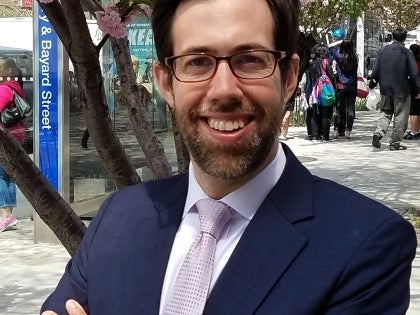
State Senator Daniel Squadron on His ‘Surreal’ First Session in Albany
Feature Article in The New York Magazine
Written by Dan Amira
Has there ever been a more potentially disenchanting time for a reform-minded freshman state senator to be introduced to the ways of Albany than this past spring? We doubt it! But those were the cards dealt to Brooklyn's 29-year-old Daniel Squadron, whose first session after being elected this November just happened to coincide with the tragicomic breakdown of order in Albany that saw government grind to a halt in June and July. It was an especially hectic time for Squadron — he got married just a few days after the stalemate ended. We talked to him about that first crazy session, serving under majority leader Pedro Espada, and the perils of one's personal and political lives colliding.
How did your assumptions about Albany, going into your first session, change as a result of the things that took place this summer?
I think that what we saw happen was the extreme conclusion of a lot of things I was talking about when I ran. You know, a very leader-driven State Senate without any bipartisan cooperation, and the culture that had developed in the State Senate over nearly the last 100 years. And so it became more extreme and obviously the damage that it did to the state was terrible, but I think a lot of the root causes are ones that I've been talking about for a long time.
Are you embarrassed by what took place?
I think that what happened in the State Senate is ... is embarrassing for me, as one of 62 senators, and I think for nineteen and a half million New Yorkers. We have to do better.
Was there a moment during the long impasse — such as the locking of the chamber or the "Frank Padavan getting a drink" incident — where you just thought to yourself, What's going on here is really absurd.
Yeah, I would add to that, you know, over 30 days without passing a whole lot of bills that needed to be passed. It was as surreal to be part of as it was to watch, in a lot of ways.
What about the reforms that were enacted after the impasse was over?
The reforms we did pass, while they're not everything we have to do, are significant. You know, the idea that for the first time ever in the State Senate, 32 members can move a bill to the floor, that from a rules perspective changes everything, and now the culture and the way we operate needs to track that.
So you feel those reforms really do have teeth?
We'll have to see how much they're used. We have put the rules in place that can change the way we operate. Now the big question is, will we make use of those rules in the best way? And time will tell.
A lot of people are clamoring for a constitutional convention. Do you think we need one?
The argument that we need to rebuild from the ground up is true. But I don't think we should get distracted and think that a constitutional convention is the only way to solve this. Certainly there are pieces that we could take care of in a constitutional convention done right, but there's a lot we can do through rules and legislation.
When you were asked by the Post about Pedro Espada's loyalty after he was made majority leader, you said, "I'm not sure of anything now." How do you feel about serving under Espada?
My preferred way to get out of the stalemate was a bipartisan operating agreement; I put it out with Senator Schneiderman. It would have done even more in terms of remaking how we operate, but the fact is that we had to get back to work and we had to get back to passing bills, and this is the way to do it.
What's the future of gay marriage in New York?
I hope we pass it as quickly as we can.
Before the vote on mayoral control, one of your fellow Democrats called you "barely an adult." Do you get that a lot? People disrespecting you or treating you different because of your relative youth in Albany?
Well, I'm new there, and I tend to be pretty aggressive on the things I believe in, and I think some people like that more than others.
Was there ever a thought to delay your honeymoon when it seemed like it could coincide with a vote on mayoral control?
Obviously, with everything that was happening, everything was on the table, and because of a lot of factors it was important to do. If the circumstances would have been different, I might have done it differently.
Where did you go, by the way?
What else do you have, Dan?
What did you think of Governor Paterson's decision to appoint a lieutenant governor despite the constitutional murkiness of doing so?
I thought it made sense. I'm not a constitutional scholar, but it seemed to me that it made sense, and it would have been positive had the court upheld it.
What are your main goals for the next session?
Continuing reform with ethics, campaign finance, pushing the rules even further are all priorities. And we still have housing bills that are critical, marriage, as you mentioned, and any number of other bills from everything from social services to community involvement.
What's been the reaction from your constituents after this summer? Do they blame you personally or have you escaped blame for what took place?
My constituents, like the entire state, are very frustrated with what happened in the State Senate, and it's my responsibility to show them that we can do better and that I, as their representative, am fighting to make it better. And people are open to that, but there's no question that they're not satisfied.
